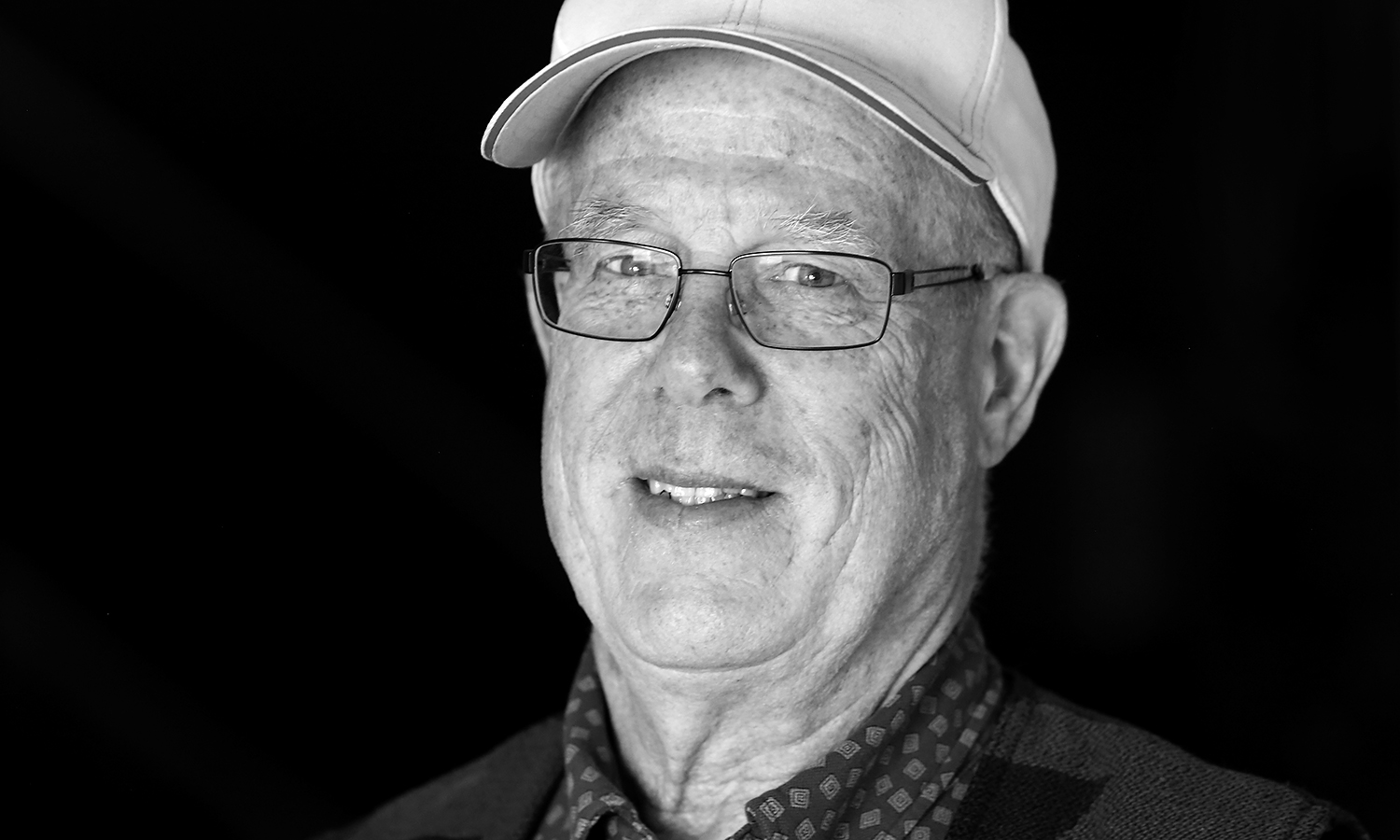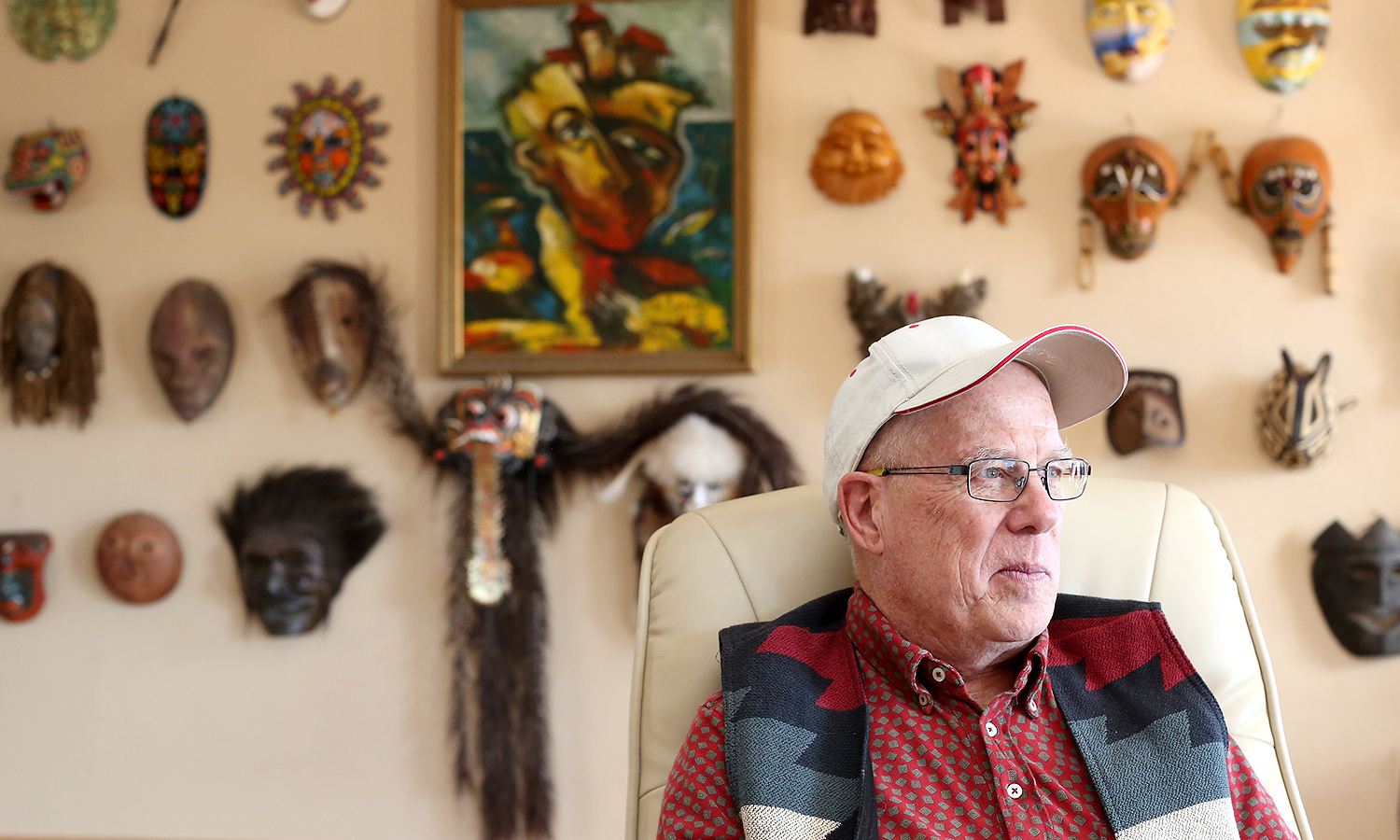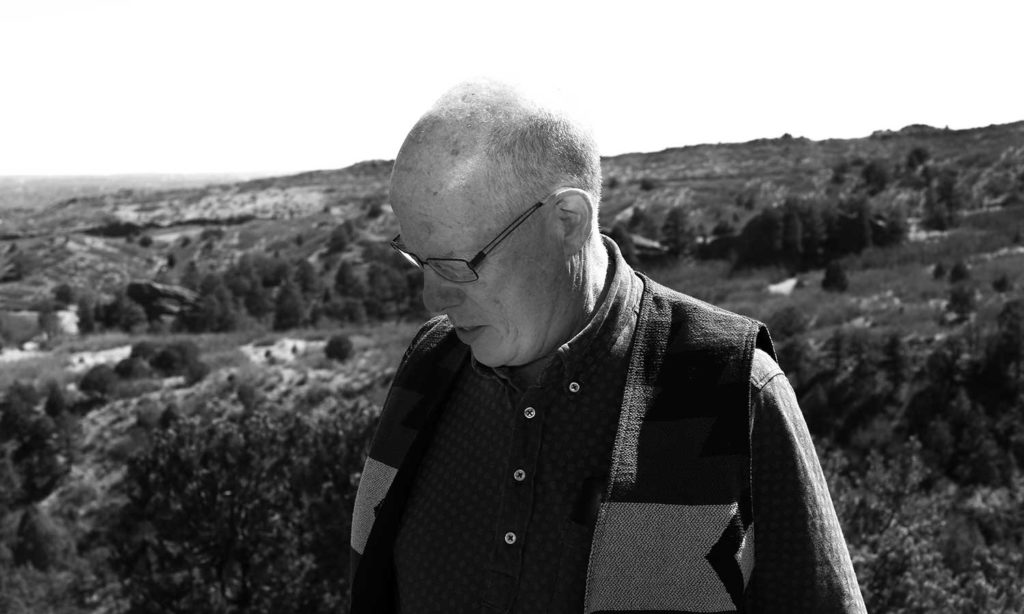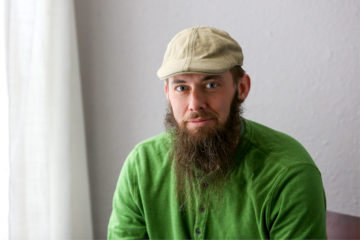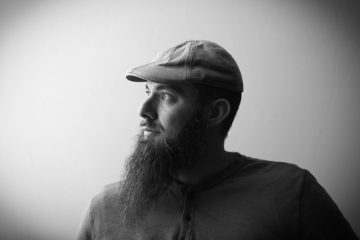It’s quiet at the house Shanti Toll shares with his wife, Coreen.
The array of a few dozen masks that came from around the world hang prominently within immediate view of the front and back doors. They are silent but full of stories.
The landscape framed by large windows at the back of the house is world-class, and in part because of Shanti’s work. Red Rock Canyon Open Space, essentially, is a jaw-dropping extension of the Tolls’ backyard.
Surrounded by this art of nature and art of humanity, we sit down and get into the meaning of it all.
Shanti, 70, talks with Humanitou about the metaphysical, the Garden of the Goddesses, and lessons from the Sixties and their relevance now.
We also talk about perseverance beyond physical limitations and the purpose of art. Inherent in it all is empathy, community and a belief in the power of consciousness.
Humanitou: Your name. My understanding of the meaning of Shanti in sanskrit is “peace.” What does that name mean to you?
Shanti: I was at the University of Pennsylvania and studying religion. It was during the Sixties and I was pretty strongly involved in the peace movement. For some of the primitive cultures that I was studying, you’d go through a rite of manhood and you would take a name.
So, in my enthusiasm, I took the word shanti, meaning peace, and it’s changed my life. Both the combination of having a name that has a meaning to it that I’m aware of, and it is more about a goal than it is necessarily a state of mind. (laughs)
Humanitou: It changed your life. How?
Shanti: Choosing a name that has a metaphysical meaning to it is about mindfulness. It’s about why we’re alive.
I have always believed in a holistic approach to life. I also believe there are many paths of spirituality. I believe there is a component of human consciousness that is beyond the physical. Metaphysical: meta is “large” and metaphysical is larger than physical.
I’m not particularly concerned about the dogma or path anyone’s on. I basically support people that are willing to look at their life and their interactions with the planet and their interactions with all living beings in a way that is connecting.
I think that if I came down to one word that I feel the meaning in life, in terms of fulfillment and in terms of why we’re here, is to have this temporal period where we connect.
When we do that, that’s when we find joy. That’s when we find peace of mind. That’s when we find meaning.
Humanitou: How do you engage with those connections on a day-to-day basis?
Shanti: I have a daily practice that is informal. I call myself an American Buddhist. It’s an oxymoron by definition. Buddhism isn’t about nationalities. It’s very individual. Part of that is meditation and physicality. I do some exercises; I have some physical problems that I was born with.
So I think the basis of it is, there’s that part which is internal with myself, and the other is trying to practice what I just said about connecting and making a difference with nature, people, animals, cosmos.
Humanitou: You live on the edge of nature, with Red Rock Canyon Open Space as your backyard. You’re also involved in local trail building. What does nature mean to you, your life?
Shanti: Nature is where beauty came from. Whether it’s a sunset or flower or gnarly tree. The human condition recognized that and then through creativity created art and things like that. My thought is our senses and our perceptions come from nature.
The core thing, and I’ll go a little more political here, the passion that I have is the relationship or the interface between wildlands and nature and planet earth without humans, and urban overpopulation. There’s an interface and that happens very strongly in Manitou Springs.
What I’ve come to is that interface needs to be a conscience process of choice of humanity. We’ve all seen a beautiful area destroyed.
Nature can be tough, but all that delicate beauty, because of millions of years of having niches they all fit into, we can destroy that. We have to decide, do we want things to deteriorate?
One of my beliefs is that if you do not see yourself as a being of nature, you will have various times in your life that you will feel out of control, you will feel as though your view is not complete.
Part of mental health is being able to recognize yourself as a special entity, part of the planet, part of nature.
Humanitou: What has been your involvement with trail building?
Shanti: I created Manitou CATS, which originally stood for a Coalition of Addicted Trail Builders. We started in Red Rock. I started all this by wanting to save this 1,500-acre piece of land that was the last of the … it’s the Garden of the Gods South.
The Indians didn’t see any difference. There are slightly bigger fins over where Garden of the Gods is now. But this is the same formations, same nature, same ecosystem. At one time, there was no difference.
In that process, we looked at what was one of the prettiest walks? One that was more intimate, that was going closer between the rocks, closer between the trees. We had a Garden of the Goddesses Club. We wanted to name the park Garden of the Goddesses to kind of balance things off (with Garden of the Gods, on the north side of the highway).
The evangelicals got quite upset with that. We got national coverage. It was done seriously, but also realizing we’re making a philosophical point.
And the reason for that is that interface issue, that if humans walk everywhere, they will destroy everywhere, that nature needs to have some room to reproduce, to not have to put up with pollution or damage.
Trails are a way of helping humans get out into nature, but they’re equally a way of keeping humans away from areas that are important, and having enough land that’s not just slowly degenerated into very tough kinds of plants.
Nature will continue anyway, it just won’t be as pretty.
Humanitou: You were involved in the Sixties. I’m curious if you see correlation between that time of upheaval and what we’re experiencing in the present, how those of us who did not experience the Sixties might look at what’s happening.
Shanti: I think one of the things I learned from the Sixties is we made many predictions of how bad things were going to get, how this was unsustainable. I was a child of the Cold War, getting myself under a desk … things you tend to remember. (laughs)
What I learned is that many of the things have happened or are happening, but my time for some of it was totally off, by decades. We did see street theater as very important, protests and peaceful street theater.
I was definitely not on the aggressive side. I was a non-violence trainer during some of the really big protests in Washington, trying to keep peace.
In terms of now, certainly I think people are looking at the youth movement about guns as a really good example of something that’s gone crazy. And I have a gun. I don’t have anything against guns, but weapons of war inside small towns is a crazy thing, not unlike, oh, let’s have nuclear war and destroy planet earth and all human beings.
It’s sort of a crazy idea to have weapons of war with kids, and protecting them with weapons of war is inherently crazy. So the youth movement is certainly something that they are aware of it themselves, not of having power, but of street theater and having the Internet.
They can do things that I can’t in terms of connecting not only America but the world. So the Internet will be an interesting component of whatever happens on that.
It is absolutely the case that fear is a kind of destroyer of joy and beauty. People, all of us, need to recognize in our own lives not losing that joy, beauty, love, connection.
There’s a lot of stuff happening out there. Pay attention to it as much or as little as you need to, to maintain some kind of balance within your own family and your own life.
Humanitou: Every life has its ups and down, its pains and joys. You mentioned you were born with a physical condition. I imagine that factored into some difficulties, at least as a child, to maintain your joy and perception of beauty in life.
Shanti: I was born with a defect created by a doctor doing a high-forceps delivery and damaging my brain. So for 69 years, I called it brain damage from childbirth. This year I’ve had to redefine it by the medical term, which is cerebral palsy.
Most people with cerebral palsy are severely handicapped. I’m very lucky in that my intelligence is OK. My right side is hemiplegic, spastic. So for 69 years, I just pretended I didn’t have a right side. As I’m getting older, I’m having to balance those sides and balance the interaction of the left and the right.
I think it’s made me more empathetic to people. When I was a special ed teacher (for 25 years), sometimes I was dealing with physical handicaps, and often times dealing with mental or emotional handicaps.
I don’t judge people. I see all of this as struggling, most trying to do the best that they can. It allows for a wide spectrum of what’s OK.
I think that having problems in life allows you to identify with other people who have struggles and not to get too righteous. One thing I really hate is righteousness on anybody’s part.
Humanitou: The dots of several things you’re talking about are connected: empathy, positivity, mindfulness, joy, open-heartedness …
Shanti: In one way, it’s about success. There are four attributes of people that are happy. One of them is that they’re successful. Now, what’s interesting is when you have a physical handicap.
I was never a good skier. I’ve never been good at anything. I played rugby and I was terrible, you know. But I do it. A lot of it is defining things that you could do, that you could be successful at.
That’s the problem with so many kids and they get so much failure. When I was a teacher, the only thing I worked on was success, and then the reading would come along or the math would come along. I needed them to feel that they could do it.
It’s what you learn from your hardship that makes the difference. What I learned is I could do things … I could write a paper and it would take me six hours, and my best friend would do it in 45 minutes. It’s very unfair. Very, very unfair. But I had a choice of whining about it and not going to an Ivy League school or …
I was one of the children that they normed the word dyslexia on. I would go down to Children’s Hospital in Boston and do all these tests. That’s why I went into special ed. I was in the test generation that they were learning these ideas on.
The thing is I learned to be patient and not give up, and also to set goals. In the process of really sticking with it, I’ve accomplished a lot in my life. It was the perseverance that I learned. It’s the reality of the situation and it’s the response that makes the difference.
Humanitou: You are on the Manitou Springs Arts Council. What does art mean to you, and what is its purpose in life?
Shanti: I think it’s recognizing design and beauty in a timeless way. I think it comes down to what is human consciousness, whether you define it as a soul, or if you’re existential and you have a period of time of being conscious, and you’re done.
How are you going to use that time?
